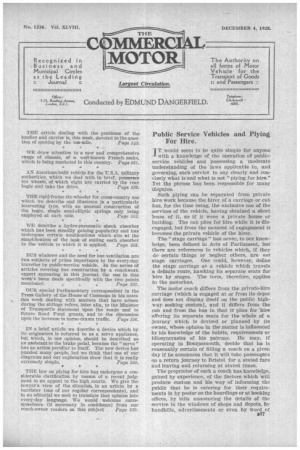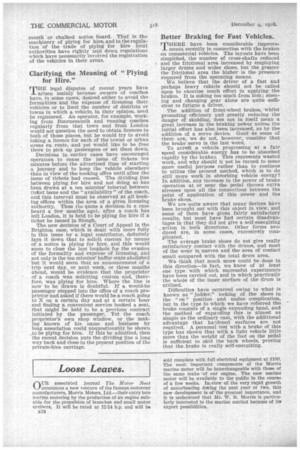Public Service Vehicles and Plying For Hire.
Page 1

Page 2

If you've noticed an error in this article please click here to report it so we can fix it.
TT. would seem to be quite simple for anyone with a knowledge of the operation of publicservice vehicles and possessing a moderate understanding of the laws applicable to, and governing, such service to say clearly and concisely what is and what is not "plying for hire." ,Yet the phrase has been responsible for many disputes.
Such plying can be separated from private hire work because the hirer of a carriage or cab has, for the time being, the exclusive use of the services of the vehicle, having obtained a short lease of it, as if it were a private house or building. The cab plies for hire while it is disengaged, but from the moment of engagement it becomes the private vehicle of the hirer.
The "stage carriage" has never, to our knowledge, been defined in Acts of Parliament, but there are references to vehicles which, if they do certain things or neglect others, are not stage carriages. One could, however, define the stage carriage as a vehicle which travels a definite route, hawking its separate seats for hire by stages. The term, therefore, applies to the motorbus.
The motor coach differs from the private-hire carriage (which is engaged at or from its depot and does not display itself on the public highway seeking custom), and it differs from the cab and from the bus in that it plies for hire offering its separate seats for the whole of a • journey which is devised or planned by its owner, whose opinion in the matter is influenced by his knowledge of the habits, requirements or idiosyncrasies of his patrons. He may, if operating in Bournemouth, decide that he is reasonably certain of filling a coach on a given clay if he announces that it will take passengers on a return journey to Bristol for a stated fare and leaving and returning at stated times. The proprietor of such a coach has knowledge, gained by experience, of the factors which will produce custom and his way of informing the public that he is catering for their requirements is by poster on the hoardings or at booking, offices, by hills announcing the details of the service in the windows of shops and depots, by handbills, advertisements or even by word of B17 mouth or chalked notice hoard. That' is the machinery of plying for hire, and in the regulation 'of the trade of plying for hire local authorities have rightly laid down regulations which have necessarily involved the registration of the vehicles in their areas.






























